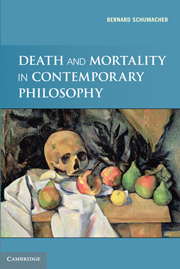Book contents
- Frontmatter
- Contents
- Preface
- Introduction
- Part One Human Personal Death
- Part Two Theory of Knowledge About Death
- Part Three Does Death Mean Nothing To Us?
- 8 The “Nothingness of Death”
- 9 Discussion of Experientialism and the Need for a Subject
- 10 Death
- Conclusion
- Bibliography
- Index of Names
- Index of Concepts
9 - Discussion of Experientialism and the Need for a Subject
Published online by Cambridge University Press: 05 June 2012
- Frontmatter
- Contents
- Preface
- Introduction
- Part One Human Personal Death
- Part Two Theory of Knowledge About Death
- Part Three Does Death Mean Nothing To Us?
- 8 The “Nothingness of Death”
- 9 Discussion of Experientialism and the Need for a Subject
- 10 Death
- Conclusion
- Bibliography
- Index of Names
- Index of Concepts
Summary
The a priori character of the Epicurean assertion that death is nothing to us
The Epicurean thesis of the “nothingness of death” has not always met with great interest among philosophers. Many of them consider it as “preposterous and stupid”, “the most absurd thing”, a “vacuity”, “fine sayings,” and “nonsense devised for the young [i.e., babblings]”, a “jest”, “extremely implausible,” and “an ancient sophism that purports to justify indifference to death”. According to Mothersill, the Greek philosopher’s point of view on the subject of death “will hardly bear looking into, but may have been intended as little more than an eristic flourish”. Such a rejection of the Epicurean “nothingness of death”, which is dismissed out of hand by describing it as a sophism, shows, in my opinion, that the gauntlet thrown down by the philosopher of the Garden is not taken seriously: this important challenge is opposed to the commonsense notion that death is an evil, perhaps even the worst of evils. Surprisingly, terms similar to those cited (against the Epicurean thesis) are sometimes used to describe the thesis that death is an evil. This thesis betrays insufficient reflection, in Rosenberg’s opinion, or “naïveté”, according to Fagot-Largeault; Rosenbaum calls it a “myth”. Is it really without any rational basis whatsoever? Are we dealing with the transformation of a peculiar psychological phenomenon into a disputed theoretical point, as Mothersill asserts? Should we not rather maintain, like Feldman, that “there is nothing incoherent about the naïve view that death can be an evil for the deceased”?
The Epicurean thesis of the “nothingness of death” implies basic assumptions, explained in the preceding chapter, that are worth examining critically. An initial premise – that of experientialism – states that every evil and every good lies in sensation, in other words, in the experience of pleasure (in the case of good) or of pain (in the case of evil). In order for a state of affairs to be described as a good or an evil for a subject, he must be capable of experiencing it (of being the subject of pleasures or pains), which presupposes parameters in time and space. A state of affairs that remained detached from experience – such as death – would be indifferent. A second premise – the need for a subject – states that the death of “N.” cannot constitute an evil for him, because he no longer exists. Indeed, in order for a state of affairs “A” to be described as an evil for “N.”, the “existential” presence of the latter is required. This thesis is equivalent to the third point that I emphasized in the preceding chapter, within the framework of my analysis of the Epicurean “nothingness of death”: “N.” would not be capable of experiencing a state of affairs “A” in T-1 and P-1 unless “A” took place during the life of “N.”, and therefore before “his” death. In other words, “N.” cannot be affected by “A” after he has died, given that he no longer is; he can be affected only insofar as he is alive. Hence death cannot be an evil for the dead “N.”, since when the death of “N.” is present, “N.” is no more. Lucretius could not be more explicit on this subject: “For if by chance anyone is to have misery and pain in the future, he must needs himself also exist then in that time to be miserable. Since death takes away this possibility and forbids him to exist for whom these inconveniences may be gathered together, we may be sure that there is nothing to be feared after death, that he who is not cannot be miserable”. In his defense of the Epicurean thesis of the “nothingness of death” and his critique of the possibility of posthumous evils, Rosenbaum adopts this second principle: “It is impossible for a loss to be bad for a person at a time when that person is dead. This is because nothing can be bad for a person unless it can have some effect on the person, and nothing can have some effect on a person unless the person is not dead. Thus, if harms are losses which are bad, then posthumous harms are not possible”. Epicurus raises an axiological question by asking whether death is an evil and, more particularly, whether it is an evil for the one who is dead. It is not a question of determining whether death is an evil for the survivors – especially for those who loved the deceased – but whether is an evil for the subject himself, not when he is still living (i.e., dying), but from the moment when he is deceased, when he “finds himself” in the state of death. The question becomes even more interesting for the philosopher, from the methodological perspective, if we take the same point of departure as Epicurus and equate a priori death (the state of death, that is) with the state of nonsurvival.
- Type
- Chapter
- Information
- Death and Mortality in Contemporary Philosophy , pp. 168 - 181Publisher: Cambridge University PressPrint publication year: 2010



